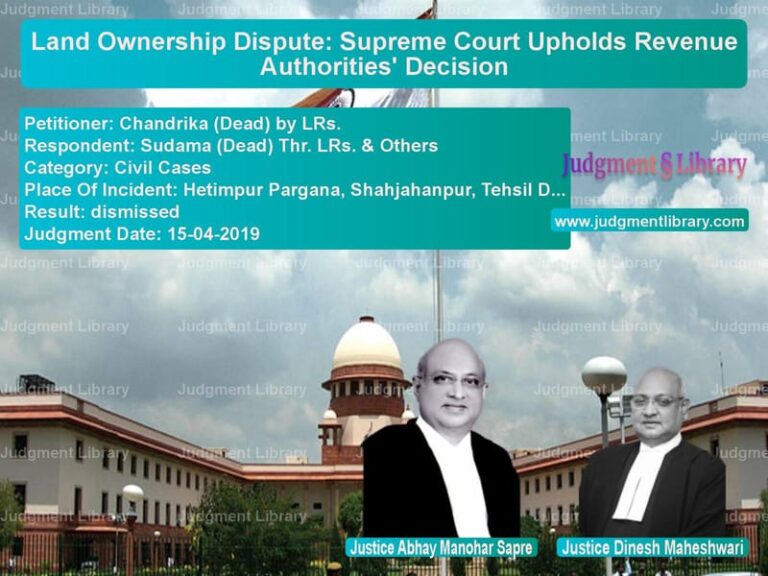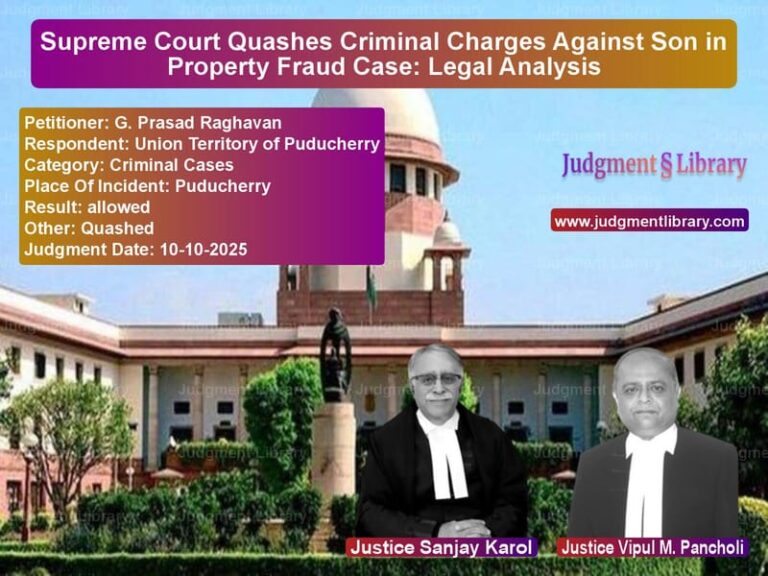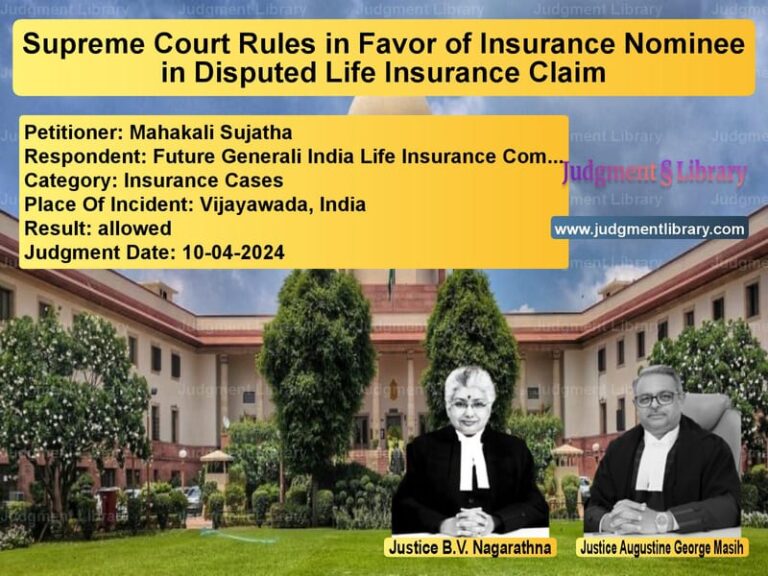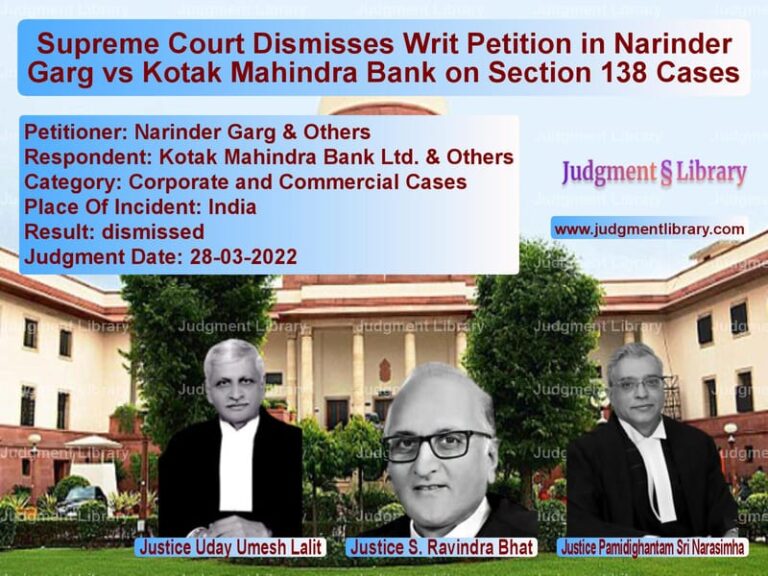Supreme Court Dismisses Tenant’s Appeal in Eviction Case: Key Takeaways on Landlord’s Rights
In a significant ruling, the Supreme Court of India dismissed an appeal challenging an eviction order in the case of Chhote Lal Nishad (D) vs. Ravinder Kumar Srivastava. The judgment reinforces the rights of landlords to reclaim their property under the Uttar Pradesh Urban Buildings (Regulation of Letting, Rent, and Eviction) Act, 1972 when bona fide need is established.
Background of the Case
The case originated from a dispute between the respondent-landlord, Ravinder Kumar Srivastava, a practicing advocate, and the appellant-tenant, Chhote Lal Nishad. The landlord had filed an eviction petition (Suit No. 2 of 2000) before the Rent Control and Eviction Officer, seeking to reclaim possession of the premises for personal and professional use.
The Rent Control Officer dismissed the eviction petition on January 9, 2001. Dissatisfied with this ruling, the landlord approached the Additional District Magistrate by filing Civil Revision Petition No. 24 of 2001, which was also dismissed on February 8, 2002. Subsequently, the landlord escalated the matter to the Allahabad High Court through Writ Petition No. 11 of 2007 (R/C).
High Court Ruling
The High Court overturned the rulings of the Rent Control Officer and the Additional District Magistrate, granting the landlord the right to file a fresh application before the Rent Control Officer. The High Court recognized the landlord’s bona fide need for the premises for his legal practice and personal use.
The High Court observed:
“This Court has appreciated the bona fide need of a lawyer in various judgments, such as Surjan Singh vs. IX ADJ Kapur (1995), Prem Nath Bhatia vs. Munsi Lal Nigam (1984), and Shobha Ram vs. VII Additional District Judge, Deoria (1993). The learned court below ought to have considered the landlord’s status, number of family members, and need for professional space.”
The High Court further directed the Rent Control Officer to reevaluate the case by taking into account all relevant factors, including the landlord’s legal practice and family requirements.
Tenant’s Appeal Before the Supreme Court
The tenant, Chhote Lal Nishad, filed an appeal before the Supreme Court, challenging the High Court’s order. The appellant argued that the High Court did not issue proper notice before quashing the orders of the lower courts and allowing the landlord to refile his eviction application.
Supreme Court’s Observations
The Supreme Court examined the procedural aspects and the merits of the case. The key observations made by the Court were:
- The High Court had only set aside the lower court’s orders and provided the landlord an opportunity to file a fresh eviction petition.
- The High Court’s decision did not cause prejudice to the tenant since the eviction application would be decided afresh.
- The tenant would be granted full opportunity of hearing in the fresh proceedings before the Rent Control Officer.
Rejecting the tenant’s argument, the Supreme Court held:
“The contention that the High Court should have issued notice before quashing the orders is not sustainable. The High Court has merely restored the landlord’s right to present his case, without ordering immediate eviction.”
Final Judgment
The Supreme Court dismissed the tenant’s appeal, stating:
“In the facts and circumstances of the case, no prejudice has been caused to the appellant-tenant. The eviction application to be filed by the respondent-landlord will be proceeded with de novo.”
Key Takeaways from the Judgment
- Landlord’s bona fide need is a valid ground for eviction: The Supreme Court upheld the principle that landlords have the right to reclaim premises for personal and professional use.
- Due process must be followed: The ruling clarifies that tenants will not suffer immediate eviction and will have an opportunity to contest fresh eviction applications.
- Judicial review of rent control decisions: The case demonstrates that High Courts can intervene when Rent Control Authorities fail to consider relevant factors in eviction matters.
Implications of the Judgment
This ruling strengthens the rights of landlords while ensuring procedural fairness for tenants:
- It reinforces that bona fide need is a legitimate ground for eviction under rent control laws.
- It prevents tenants from indefinitely occupying premises by challenging procedural aspects.
- It provides landlords with legal recourse in cases where lower courts have erroneously dismissed eviction petitions.
Conclusion
The Supreme Court’s decision in Chhote Lal Nishad vs. Ravinder Kumar Srivastava is a crucial ruling in rent control jurisprudence. By dismissing the tenant’s appeal, the Court reinforced the principle that landlords have a right to reclaim their property when a bona fide need is established. At the same time, it ensures that eviction proceedings are conducted fairly and in compliance with legal requirements.
Don’t miss out on the full details! Download the complete judgment in PDF format below and gain valuable insights instantly!
Download Judgment: Chhote Lal Nishad (D vs Ravinder Kumar Sriva Supreme Court of India Judgment Dated 05-04-2017.pdf
Direct Downlaod Judgment: Direct downlaod this Judgment
See all petitions in Landlord-Tenant Disputes
See all petitions in Property Disputes
See all petitions in Specific Performance
See all petitions in Judgment by R. Banumathi
See all petitions in Judgment by Sanjay Kishan Kaul
See all petitions in dismissed
See all petitions in supreme court of India judgments April 2017
See all petitions in 2017 judgments
See all posts in Civil Cases Category
See all allowed petitions in Civil Cases Category
See all Dismissed petitions in Civil Cases Category
See all partially allowed petitions in Civil Cases Category







